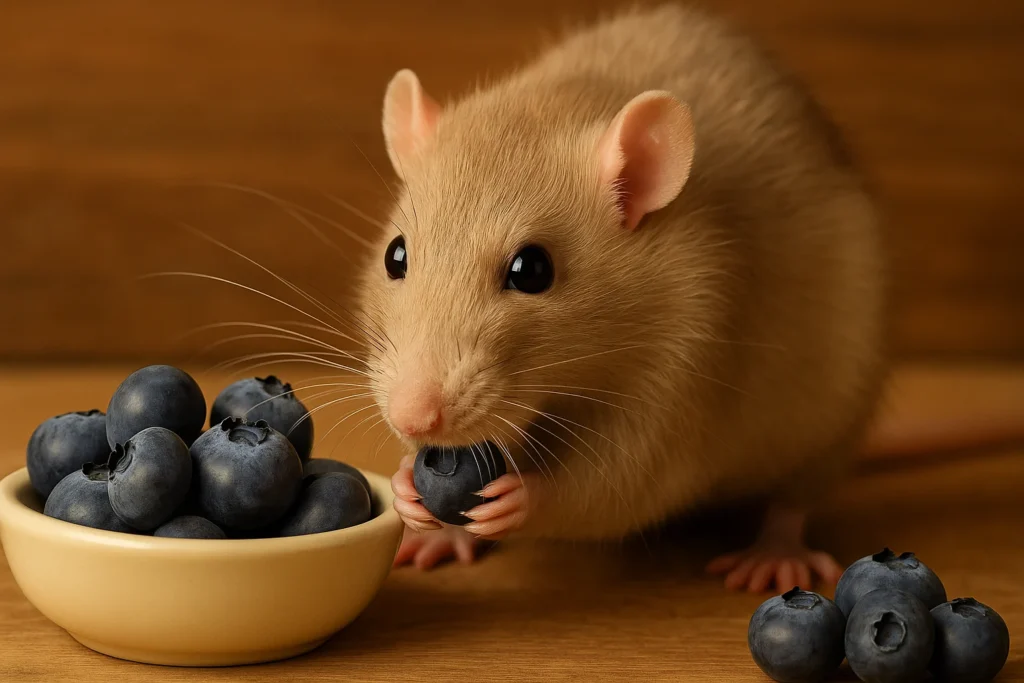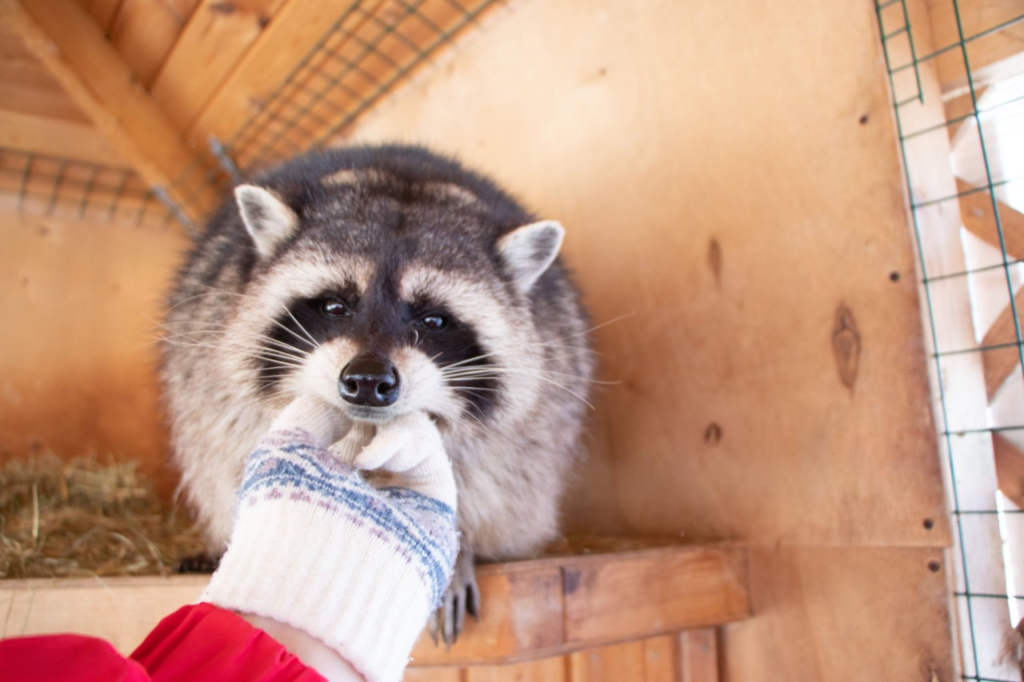Can rats eat blueberries? The short answer is yes! Pet rats can safely enjoy blueberries as a healthy treat when offered in moderation. In this article, you’ll discover not only the nutritional value and health benefits of blueberries for rats but also how to serve them properly, the best forms to use, and healthy alternatives.
Blueberries grew in popularity as a healthy superfood. So all the benefits must apply for rats too, right? Indeed a lot of vitamins and minerals that can be found in the perennial flowering plant are good for the health of the critters.
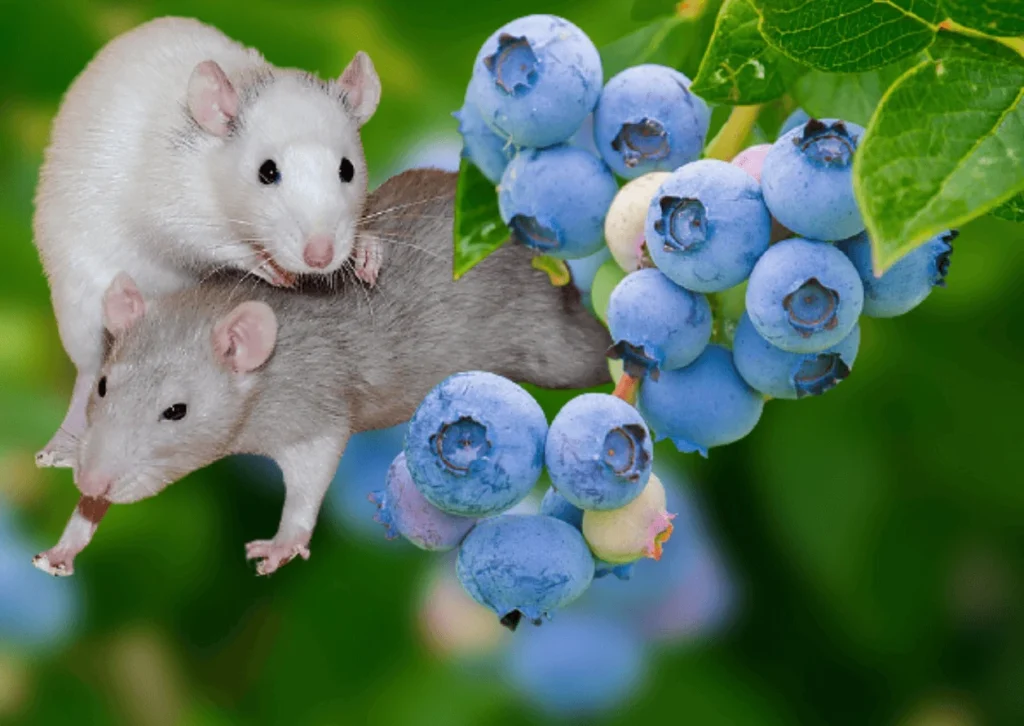
Are Blueberries Good For Rats?
Blueberries can not only enrich the diet of your rats, but they also support the immune system. This is due to their high amount of vitamins, minerals and antioxidants.
In fact, many studies that show the benefits for us humans were done with rats. As crucial as these experiments might be, they offer a great value of information for rat parents.
A good example of one of these studies is the testing researchers from the University of Houston did. They found out that the substances in blueberries are beneficial to the brains of rats. The memory of older rats worked significantly better when the fruit was given.
Other studies show, that antioxidants can help to prevent tumors. For me, this is the main reason why I like blueberries so much as a rat food, as the little critters are quite prone to this disease.
Nutritional Value Of Blueberries
Let’s dive into the nutritional value of blueberries. As I mentioned before the micronutrients are very interesting, but I want to start with the macro view first.
Fun fact: It might be surprising that the berries are made to 84 % of water.
Below you find a table of the nutritional value of raw blueberries per 100 g:
- Calories: 57
- Carbohydrates: 14.5 g
- Fiber: 2.4 g
- Protein: 0.7 g
- Fat: 0.3 g
Micronutrients:
- Vitamin C – Immune support and antioxidant
- Vitamin K – Important for blood clotting and brain health
- Manganese – Supports metabolism and bone health
- Polyphenols & Anthocyanins – Natural antioxidants that protect against cellular damage
The low fat and calorie content make blueberries a weight-friendly treat, while their high water content supports hydration. However, overfeeding can cause digestive upset like diarrhea, so portion control is key.
All the data is from nutritiondata.self.com. With fruits, the actual concentrations can change a bit depending on where and how the plants were grown.
When you look at the nutritional value, you can easily see, that it would be hard to get fat rats from feeding too many blueberries. Apart from that, they are a good source of fiber.
If you take a look at the micronutrients at Nutritiondata you will notice, that the fruit contains a lot of different vitamins and minerals. While this is true, vitamin k and vitamin c are the only ones with high numbers.
Accordingly, to a study, vitamin k is responsible for improvements in memory. Apart from that is good for blood circulation and can even reverse the toxic effects of rat poison.
How Many Blueberries Can Rats Eat?
Generally, you shouldn’t give your rats much of one kind of food.
This is also true for blueberries.
Two or three berries per rat are enough. Have in mind that they contain a lot of water. Because of that overfeeding can cause diarrhea as the liquid can irritate the digestive system.
Variety is king. You should mix the berries up with a lot of different other fruits and vegetables. A rotation with strawberries, cherries and cranberries might be a good match.
Whatsoever, with feeding blueberries you are on the right track as catering a lot of fresh food is a good thing for your little friends.
As good as fruits are, a well-balanced rat food should always be the foundation of the diet. This type of food is specially designed for the needs of pet rats and ensures that no malnourishment occurs.
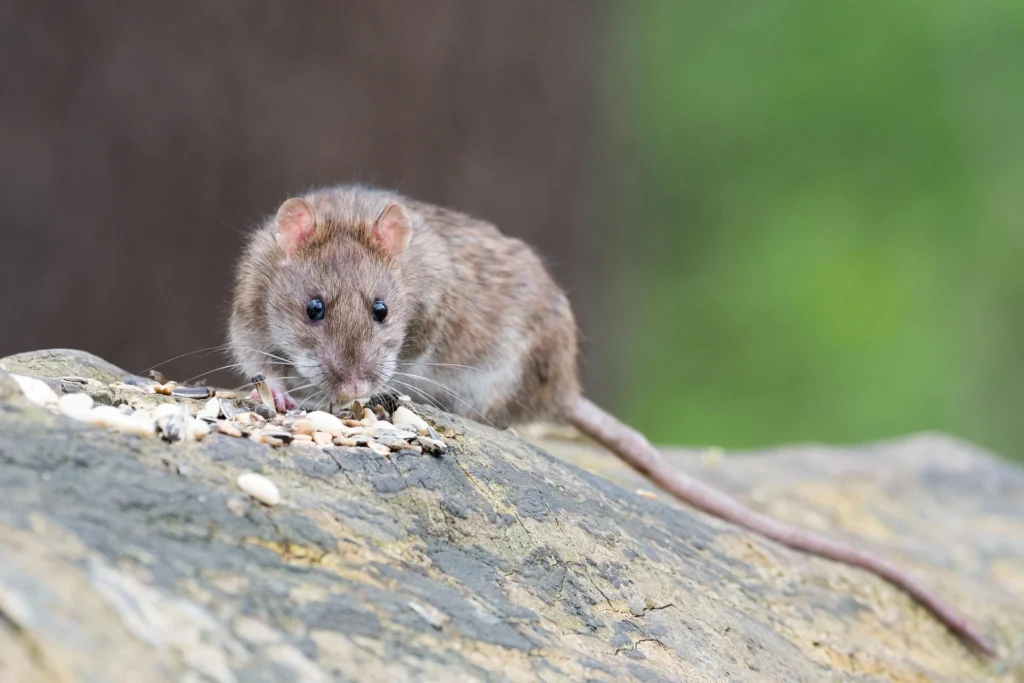
How To Feed Blueberries
To be honest, there is nothing special about feeding pet rats blueberries.
Just put them into the food bowl and see what happens.
Sometimes rats might don’t know what to do with the berries. If the is the case with your little friends, you can cut the fruits in half. I bet that will solve the problem.
Be prepared for blue-colored rat faces. There is nothing you have to worry about. But it can happen that you forget that your critters had berries. When you see them the next day their appearance might be shocking.
Frozen, Dried Or Powder?
You don’t have to make a decision here. Rats can have all kinds of blueberries. No matter if they are frozen, dried or in form of powder. The only thing is, that they all come with different properties:
- Frozen: Most rats like frozen berries as much as fresh ones. But you will have to unfreeze them before you put them in the rat cage. In hot summer months, cold berries are a good refresher.
- Dried: You won’t run into the water problem with these. Apart from that, the nutritional values are denser. You should also make sure, to choose a product without additional sugars. Often dried fruits are more expensive than their fresh counterparts.
- Powder: Powder is an extract and literally contains high amounts of the best micronutrients. But therefore it is the most expensive variant.
Blueberry Alternatives
The diet of rats should be to at least 20 % of fresh food on a regular basis. Additionally, you (or the supermarket near you) don’t have blueberries on the shelf all the time. So you will need some other fresh fruits and vegetables you can cater to your rats. Below you find a list of fruits and vegetables you can safely feed.
Fruits:
- Apples (without seeds)
- Blackberries
- Cherries
- Cranberries
- Grapes
- Kiwis
- Melons
- Papayas
- Raspberries
- Strawberries
Vegetables:
- Broccoli
- Carrots
- Cauliflower
- Choy
- Cucumber
- Green beans
- Kale
- Lettuce
- Spinach
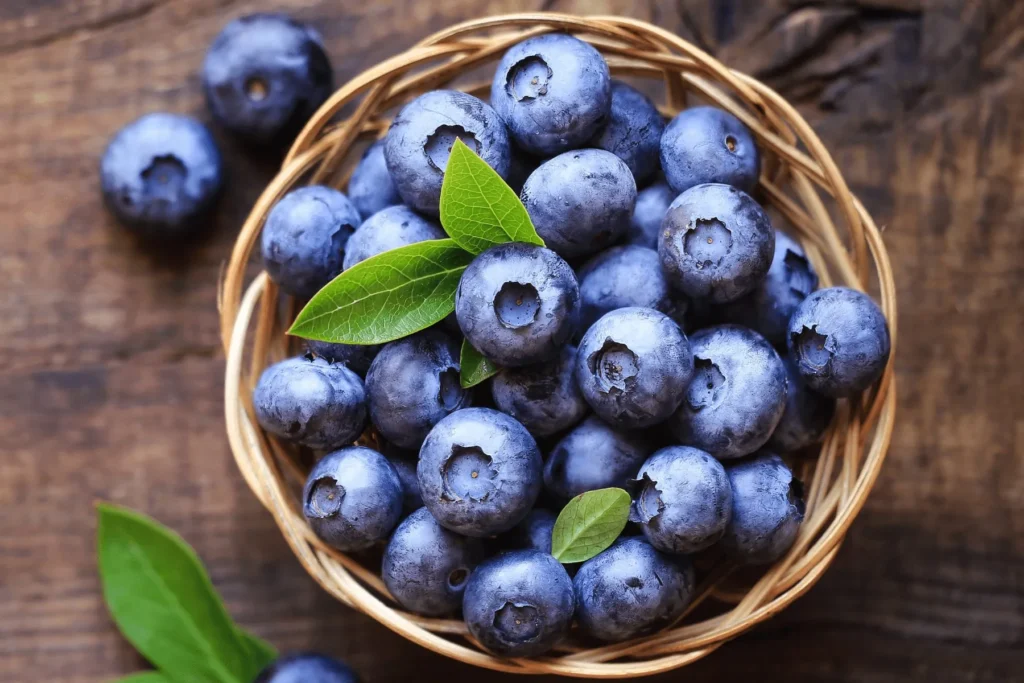
As you see it is not difficult to find some healthy snacks for your little friends. Just make sure that you inform yourself well before you give your rats any new food. This way you will avoid feeding anything that is toxic.
Wild rats are known to eat anything even our waste. That is not for pet rats. Everything you cater should be fresh, rotten food is for the garbage bin only.
Wrapping Things Up
Blueberries are a nutritious, antioxidant-rich treat for pet rats when fed in moderation. They can help improve immune function, brain health, and potentially lower the risk of tumors. However, portion control and variety are essential to avoid digestive issues and ensure a well-rounded diet.
For best results:
- Feed 2–3 blueberries per rat occasionally.
- Rotate with other fruits and veggies.
- Use fresh or unsweetened forms for optimal nutrition.
Keep your rats healthy and happy by offering a balanced diet with a mix of commercial rat food, fresh produce, and love.
Final Thoughts: Should You Feed Blueberries to Rats?
Absolutely! Blueberries are:
✅ Safe
✅ Nutritious
✅ Tasty
✅ Easy to serve
Just remember—moderation is key. Mix blueberries with a variety of fruits and vegetables, and base your rat’s diet around a high-quality commercial food.
Your furry friends will thank you with happy squeaks and blue noses!
